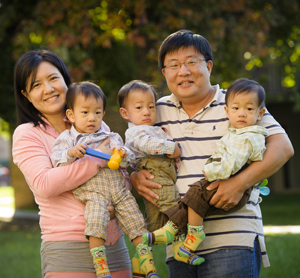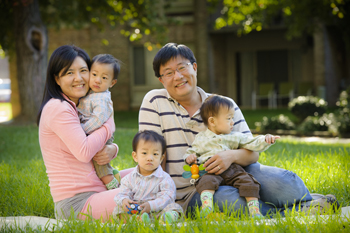Multiples and High Risk Pregnancy: Wonil and Jiyoung's Story
Good Things Come in Threes
Wonil Kim and his wife, Jiyoung Choi, eagerly viewed an ultrasound of what they believed to be their first baby. One week later, a followup test multiplied their expectations by two. And then the next ultrasound revealed triplets.
 "I was speechless," says Jiyoung. She and her husband had moved to Frederick, Maryland only a few months before and were living in a third floor apartment—not the most convenient for three babies on the way. And a multiple pregnancy— high risk by definition—would require vigilant, experienced medical care at every step.
"I was speechless," says Jiyoung. She and her husband had moved to Frederick, Maryland only a few months before and were living in a third floor apartment—not the most convenient for three babies on the way. And a multiple pregnancy— high risk by definition—would require vigilant, experienced medical care at every step.
Experienced Medical Professionals
During her pregnancy, Jiyoung experienced issues common to many expectant mothers. But other aspects of her pregnancy were less routine.
"The triplets shared a single large placenta," says Dennis Amini, MD, maternal fetal medicine specialist with Kaiser Permanente. A shared placenta increases the risk of complications related to development, growth and survival. In addition, Dr. Amini says, "One baby had a cleft and another had a thick skin fold on the neck." This extra fold spurred more concerns. Under Dr. Amini’s diligent care, the triplets received frequent testing and monitoring.
Tests fortunately revealed no genetic abnormalities or heart problems. However, to deliver the three boys safely, Jiyoung would need the special care and knowledgeable guidance of the team at Holy Cross Hospital.
Specialized Maternity Services
Three days before delivering her babies, Jiyoung was admitted to Holy Cross Hospital’s High Risk Perinatal Center due to a hormonal reaction from the stress of carrying three babies. The three babies’ weight made it hard to breathe or lie down, too.
In the High Risk Perinatal Center, Jiyoung and her babies received specialized care, 24 hours a day. The center is supported by the expertise of board certified obstetricians/gynecologists, perinatologists, diabetes nurse specialist and registered nurses with advanced training in fetal monitoring.
When the big day arrived, the hospital’s labor and delivery team was ready. Dr. Amini, an anesthesiologist, three obstetricians, and eight nurses were on hand and equipped for any unforeseen complications.
“They were very well prepared,” says Jiyoung.
Expert Care for Fragile Newborns
Jiyoung says she will never forget the moment the doctors and nurses held David, Jonathan and Paul up to meet her before they were taken to the hospital’s Neonatal Intensive Care Unit (NICU).
 The NICU was the ideal place for the premature babies, with a highly specialized team equipped to monitor Jonathan’s breathing and swallowing and for conditions such as David’s cleft lip and palate.
The NICU was the ideal place for the premature babies, with a highly specialized team equipped to monitor Jonathan’s breathing and swallowing and for conditions such as David’s cleft lip and palate.
Holy Cross Hospital’s level IIIB NICU cares for more critically ill newborns than any other hospital in Maryland. “It features state of the art technology to care for babies who are born early or have medical complications that require constant observation or care,” says Cyndi Hawley, RN, NICU director, Holy Cross Hospital.
David, Jonathan and Paul were in the NICU for 17 days under the watchful eyes of neonatologists (physicians who specialize in caring for critically ill newborns), registered nurses, neonatal nurse practitioners, Physical therapists, respiratory therapists, social workers, case managers and lactation consultants.
Jiyoung says knowing the babies were in good hands made her recovery easier.
After leaving Holy Cross Hospital, the new parents moved to a first floor apartment and adjusted to life raising triplets. The boys, now 18 months old, eat, sleep and play like the healthy toddlers they are.
